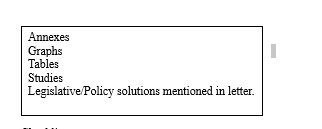A lot of time in Brussels is spent writing letters to officials and MEPs.
A lot end up being ignored. They come across as whiny. Most are too long.
If you want to continue being ignored, stop reading.
If you want your ideas to stand a better chance of being taken up by officials and politicians, you’ll find my personal template and a checklist.


Checklists
Does and Don’ts
Do
- Ask yourself if a call or coffee is not more effective than a letter.
- Be clear about who you are communicating to and why. You are writing to persuade a decision-maker to decide in your favour. Ask yourself what points will persuade them to act in your favour. The most compelling points for the reader may differ from those dearest to you.
- Highlight those points that speak to them: e.g. following the Political Guidelines, Better Regulation Rulebook compliance, out of sync with major strategic initiatives, procedural irregularities, unintended consequences.
- Be specific about the issue in the subject header. For example, if chemicals, mention the full substance name and CAS number and the procedure.
- 1 page.
- Font 12
- Use Plain English.
- 1 central point – and up to 3 supporting points.
- At the start, state in one concise paragraph what the letter is about. What is the essence of the issue?
- Put yourself in their shoes.
- Make sure your points are fair and objective.
- Provide credible evidence and data to support your point of view.
- Add tables, charts, and supporting studies in Annexes.
- Provide a viable solution to the political/public policy issue at hand.
- CC officials who are working on the issue.
- Phone the person you are sending it to in advance, or at least the desk officer managing the file.
- Send the letter in time – before any decision has been taken.
- Get someone else to read it to see if it makes sense.
- Run it past a spell checker.
Don’t Do
- Use a misleading subject line.
- CC 20-200 people.
- Use a passive-aggressive tone.
- Claim you support the initiative and then spend four pages saying it is terrible but never offering an alternative.
- Random bolding of words without rhyme or reason.
- Send the letter after the decision has been made.
- Send the letter because it will put your views on the record, despite your views already being well known and on the record.
- Send a letter to a Commissioner before informing the desk officer
- Send a letter to a Commissioner criticising a unit without thinking the desk officer is going to draft the reply, and the Commissioner not read it.
- Send a letter to the Cabinets on Inter-Service Consultation too early or too late.
- Send a letter that’s been drafted and edited by a Committee of technical experts. Persuasive writing is rarely their strong spot.
- Send a letter in anger. It comes across poorly
- Pile in lots of different points. Have no more than 3 points in the letter, and ideally have one
- Mass emailing of the letter. They’ll be filtered automatically into the bin.
- Never bothering to see how the letter landed with the intended reader.
- Don’t make clear what you want.
- Use discredited experts to support your letter.
- Use discredited points to support your points – the climate change denial-like points.
- Raise bonkers points that only Roger Helmer MEP would have supported.